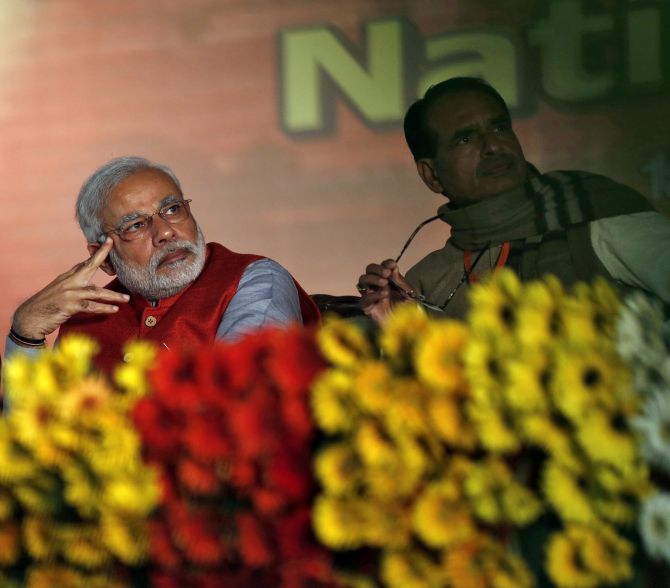 ‘The Narendra Modi-led Bharatiya Janata Party’s best performance is expected from MP’
‘The Narendra Modi-led Bharatiya Janata Party’s best performance is expected from MP’
‘The Congress haven’t had an effective leader since Gandhiji. And after him all those, who have stood up to lead the party have been Gandhis only in name’
‘The Congress has too many power centres -- Digvijaya Singh, Kamal Nath, Jyotiraditya Scindia, Arun Yadav…’
“The BJP too has its share of problems. Shivraj Singh Chouhan isn't particularly fond of Modi. But organisational weaknesses within the Congress prevents it from cashing in on the inadequacies of the BJP.'
The BJP is confident of winning all the 29 Lok Sabha seats in the state and even political experts believe the Congress stands no chance. Bikash Mohapatra reports
The Bharatiya Janata Party's prime ministerial candidate Narendra Modi has been on a campaign overdrive in the last few months.
In the process Modi has made repeated forays into Uttar Pradesh, Bihar, West Bengal -- where his war of words with Mamata Banerjee is well-documented. He has campaigned aggressively from Andhra Pradesh to Odisha.
Amid the flurry of activities, Madhya Pradesh hasn’t quite been the focus, right from the outset.
The polling in the central state, with 29 constituencies, was conducted in three phases -- April 10, April 17 and April 24 -- and figures indicated a considerable increase in the turnout (around 60 per cent) as compared to the 2009 elections (51 per cent).
However, the BJP top brass was conspicuous by their absence throughout. It is not that the party high command neglected the state per se. It is just that they are confident about a victory in the state.
This confidence stemmed from the party’s strong support base, its structural framework -- everyone from the grassroot level to the top is aware of their responsibility and most importantly the lack of a cohesive opposition.
Even though there’s still some time left before the results are announced, the mood in the ruling party has been upbeat. For the eventuality in Madhya Pradesh is beyond prediction.
In fact, it is a foregone conclusion.
“The BJP will have the best result in the country from this state,” asserted Anil Madhav Dave, a Rajya Sabha member and the party’s chief strategist in the state.
“The party will benefit significantly from the high quality work done at the grassroot level in the last 20-25 years,” continued the veteran leader, adding, “We are already calling it Mission 29 -- winning all of the Lok Sabha seats from the state.”
Even before being asked if winning all seats seemed a bit far-fetched, Dave proceeded to explain why he doesn’t foresee the Congress offering much resistance in these polls.
“The Congress doesn’t offer a serious fight and in fact, has grown weaker by the day. You can partly blame it on the infighting among its power centres and partly on the ideological bankruptcy that has afflicted the party,” he reasoned.
“They haven’t had an effective leader since Gandhiji. And after him (the Mahatma) all those who have stood up to lead the party have been Gandhi only in name, failing to provide the leadership and guidance the party requires.”
Experts too significantly play down the chances of the Congress.
“For the Congress, it is a lost cause. It will be BJP all they way except for a few seats like Guna (Jyotiraditya Scindia’s constituency), Chhindwara (Kamal Nath), Mandsour (Meenakshi Natarajan) and Khandwa (Arun Yadav),” said political analyst Bagish Jha.
“The Congress suffers from a lack of an organisational structure and leadership. There are too many power centres. Digvijaya Singh, Kamal Nath, Jyotiraditya Scindia, Arun Yadav -- all have their own groups,” continued Jha, proceeding to explain his point in detail.
“It is a well-known fact that Digvijaya Singh (despite the recent controversy over his relationship with journalist Amrita Rai) still has the biggest hold from among the lot but he is not given much importance within the party.”
“In fact just two months before the elections Arun Yadav was named the state party chief. He is not a strong leader. Besides, he had to focus on his seat as well. In fact, Khandwa (Yadav’s constituency) will witness the toughest battle of all,” added Jha.
“Veteran leader Nand Kishore Chauhan (the sitting MP) is representing the BJP again in Khandwa while Alok Agarwal -- involved in the Narmada Bachao Andolan -- is the Aam Aadmi Party candidate from the seat. In fact he is the strongest of the AAP candidates in the state, and yet won’t win.”
In the 2009 elections, the Congress-led United Progressive Alliance had done considerably well, winning 12 seats to the 16 by the BJP-led National Democratic Alliance.
However, the party’s fortunes have since plummeted. In the assembly elections last year, the party recorded its worst-ever performance, winning just 58 of the 230 seats.
“The Congress has only candidates, no party cadres. The ground-level workers of the party are very demoralised. They have all but given up,” insisted Jha, before turning his focus to the likely winners.
“The BJP too has its share of problems. Shivraj Singh Chouhan, the chief minister, is of course influential and not particularly fond of Narendra Modi. But the party high command ensures that the differences are kept at bay,” he said, adding, “Also the organisational weaknesses within the Congress prevent the party from cashing in on the inadequacies of the BJP.
“Take Indore, for example. Sumitra Mahajan, a seven-time BJP MP from the seat, hasn’t done much work during this tenure. However, she is expected to win comfortably.”
Amid all the positivity, and the expected triumph for the BJP, there lay a stark realisation.
“If you look at the broader perspective, it is not a good thing for a democracy,” explained Dave.
“For in a democracy, every party has to have a quality opposition. It not only offers competition but also helps improve the ruling party’s overall performance.”
“At the moment we (the BJP) seem to be lacking it,” he added.
For the moment though Madhya Pradesh looks set to make a significant contribution to the NDA’s chances in general and give a requisite fillip to Modi’s prime ministerial aspirations in particular.
“It is like a walkover for the BJP in Madhya Pradesh. The expectations can range from a minimum of 20 seats to a maximum of 25,” concluded Jha.
Image: BJP's PM candidate Narendra Modi with Madhya Pradesh CM Shivraj Singh Chouhan in New Delhi
Photograph: Ahmad Masood/Reuters










 © 2025
© 2025